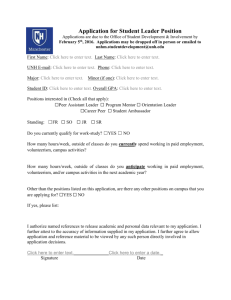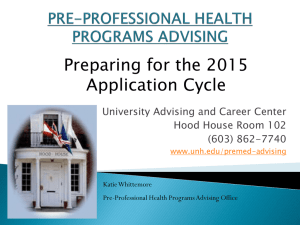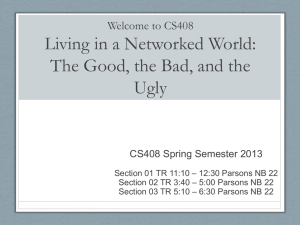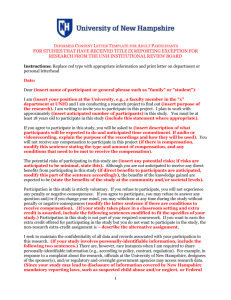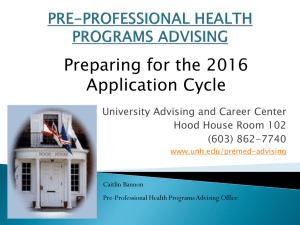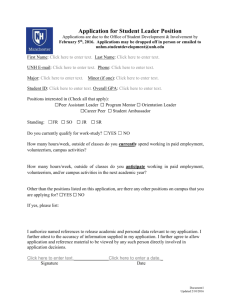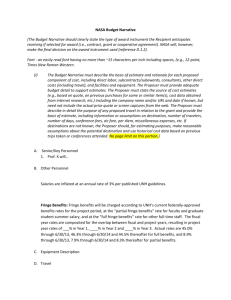draft of bias response protocol pilot
advertisement
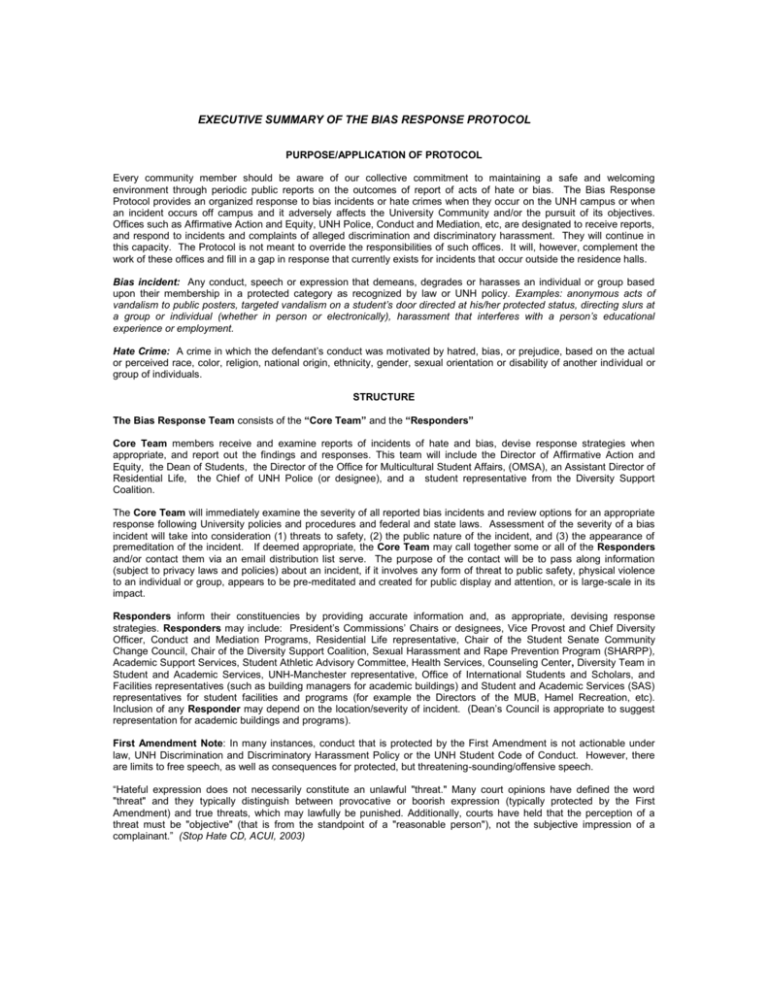
EXECUTIVE SUMMARY OF THE BIAS RESPONSE PROTOCOL PURPOSE/APPLICATION OF PROTOCOL Every community member should be aware of our collective commitment to maintaining a safe and welcoming environment through periodic public reports on the outcomes of report of acts of hate or bias. The Bias Response Protocol provides an organized response to bias incidents or hate crimes when they occur on the UNH campus or when an incident occurs off campus and it adversely affects the University Community and/or the pursuit of its objectives. Offices such as Affirmative Action and Equity, UNH Police, Conduct and Mediation, etc, are designated to receive reports, and respond to incidents and complaints of alleged discrimination and discriminatory harassment. They will continue in this capacity. The Protocol is not meant to override the responsibilities of such offices. It will, however, complement the work of these offices and fill in a gap in response that currently exists for incidents that occur outside the residence halls. Bias incident: Any conduct, speech or expression that demeans, degrades or harasses an individual or group based upon their membership in a protected category as recognized by law or UNH policy. Examples: anonymous acts of vandalism to public posters, targeted vandalism on a student’s door directed at his/her protected status, directing slurs at a group or individual (whether in person or electronically), harassment that interferes with a person’s educational experience or employment. Hate Crime: A crime in which the defendant’s conduct was motivated by hatred, bias, or prejudice, based on the actual or perceived race, color, religion, national origin, ethnicity, gender, sexual orientation or disability of another individual or group of individuals. STRUCTURE The Bias Response Team consists of the “Core Team” and the “Responders” Core Team members receive and examine reports of incidents of hate and bias, devise response strategies when appropriate, and report out the findings and responses. This team will include the Director of Affirmative Action and Equity, the Dean of Students, the Director of the Office for Multicultural Student Affairs, (OMSA), an Assistant Director of Residential Life, the Chief of UNH Police (or designee), and a student representative from the Diversity Support Coalition. The Core Team will immediately examine the severity of all reported bias incidents and review options for an appropriate response following University policies and procedures and federal and state laws. Assessment of the severity of a bias incident will take into consideration (1) threats to safety, (2) the public nature of the incident, and (3) the appearance of premeditation of the incident. If deemed appropriate, the Core Team may call together some or all of the Responders and/or contact them via an email distribution list serve. The purpose of the contact will be to pass along information (subject to privacy laws and policies) about an incident, if it involves any form of threat to public safety, physical violence to an individual or group, appears to be pre-meditated and created for public display and attention, or is large-scale in its impact. Responders inform their constituencies by providing accurate information and, as appropriate, devising response strategies. Responders may include: President’s Commissions’ Chairs or designees, Vice Provost and Chief Diversity Officer, Conduct and Mediation Programs, Residential Life representative, Chair of the Student Senate Community Change Council, Chair of the Diversity Support Coalition, Sexual Harassment and Rape Prevention Program (SHARPP), Academic Support Services, Student Athletic Advisory Committee, Health Services, Counseling Center, Diversity Team in Student and Academic Services, UNH-Manchester representative, Office of International Students and Scholars, and Facilities representatives (such as building managers for academic buildings) and Student and Academic Services (SAS) representatives for student facilities and programs (for example the Directors of the MUB, Hamel Recreation, etc). Inclusion of any Responder may depend on the location/severity of incident. (Dean’s Council is appropriate to suggest representation for academic buildings and programs). First Amendment Note: In many instances, conduct that is protected by the First Amendment is not actionable under law, UNH Discrimination and Discriminatory Harassment Policy or the UNH Student Code of Conduct. However, there are limits to free speech, as well as consequences for protected, but threatening-sounding/offensive speech. “Hateful expression does not necessarily constitute an unlawful "threat." Many court opinions have defined the word "threat" and they typically distinguish between provocative or boorish expression (typically protected by the First Amendment) and true threats, which may lawfully be punished. Additionally, courts have held that the perception of a threat must be "objective" (that is from the standpoint of a "reasonable person"), not the subjective impression of a complainant.” (Stop Hate CD, ACUI, 2003) EXAMPLES OF RESPONSES AND ACTION STEPS Initiate an education campaign targeted to either a specific area, or the entire campus, that outlines what happened, why it is being investigated, how information about the incident can be reported and to whom. Provide support and information for the person or group harmed. Provide counseling and resources available on campus and in the community at large. Provide information about a safety plan, or programming on safety strategies. Reach out to the Deans and appropriate support staff to offer talking points for bringing up incidents that occur in academic buildings. Adapt talking points and share with other staff around campus. Provide classroom or group/individual based talking points for follow-up discussions. Conduct a threat assessment with UNH or Durham Police. Follow through with safety recommendations. Offer mediation through the Office of Conduct and Mediation. Establish direct contact with the person or group involved in the incident. This can happen with a member of the VPSAS staff, Associate Dean, Athletic staff, UNH Police, or other University office or authority, as appropriate. Write forum article or letter to The New Hampshire editor outlining the incident and campus/community response to it. Pursue disciplinary action or investigation by the Affirmative Action and Equity Office, the Director of Conduct and Mediation Programs, or Human Resources. . WHERE TO GO TO SEEK ADVICE OR REPORT A HATE OR BIAS INCIDENT Affirmative Action and Equity Office (603.862.2930 v/tty) (http://reportit.unh.edu/) (http://www.unh.edu/affirmativeaction/index.html) Office of Conduct and Mediation (603.862.3377) (http://www.unh.edu/ocm/) UNH Police (603.862.1427) (www.unh.edu/upd) or Durham Police (603.866.2324) (http://durham.nh.us/departments/police/police.html) for criminal investigation. Office of Vice President for Student and Academic Services (603.862.2053), Dean’s Offices, or other SAS offices. (http://www.unh.edu/vpsas/) (www.unh.edu/academic-affairs) Office of Vice Provost and Chief Diversity Officer (603.862.3290) (http://www.unh.edu/diversity) Report to a Clery Act Campus Security Authority (www.unh.edu/upd/clery.pdf) Office of Multicultural Student Affairs ( 603.862.2053) (http://www.unh.edu/omsa/index.html) Office of President’s Commissions (603.862.1058) President’s Commission on the Status of Women (http://www.unh.edu/womens-commission/); President’s Commission on the Status of People of Color (http://www.unh.edu/cspc/); President’s Commission on the Status of Gay, Lesbian, Bisexual and Transgender Issues (http://www.unh.edu/glbt/); President’s Commission on the Status of People with Disabilities (no web site) SHARPP (Sexual Harassment and Rape Prevention Program) (603.862.3494) (http://www.unh.edu/sharpp) Residential Life or Housing (603.862.2268) (http://www.unh.edu/residential-life/index.html) (603.862.2120) (http://www.unh.edu/housing/index.html) Office of Human Resources (603.862.0501) (http://www.unh.edu/hr/) Health Services (603.862.1530) (http://www.unh.edu/health-services/) Counseling Center (603.862.2090) (http://www.unhcc.unh.edu) International Students and Scholars (603.862.1288) (http://www.unh.edu/oiss/index.html) For the full Bias Response Protocol document, please go to www.unh.edu/vpsas/ or www.unh.edu/affirmativeaction/policies.html This Executive Summary was sent to Provost Bruce Mallory and Vice President for Student and Academic Services Mark Rubinstein on Thursday, January 18, 2007 by Donna Marie Sorrentino and Anne Lawing
